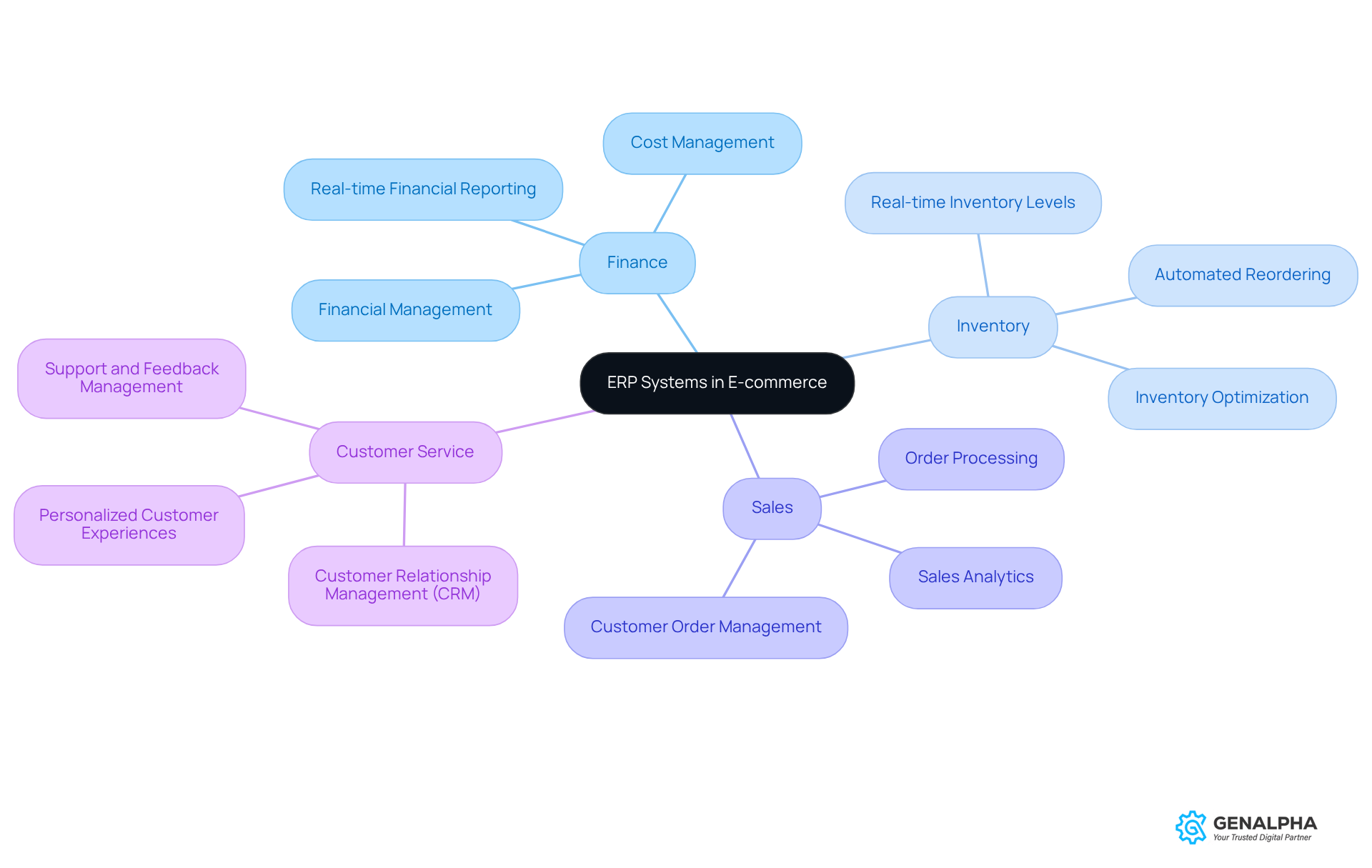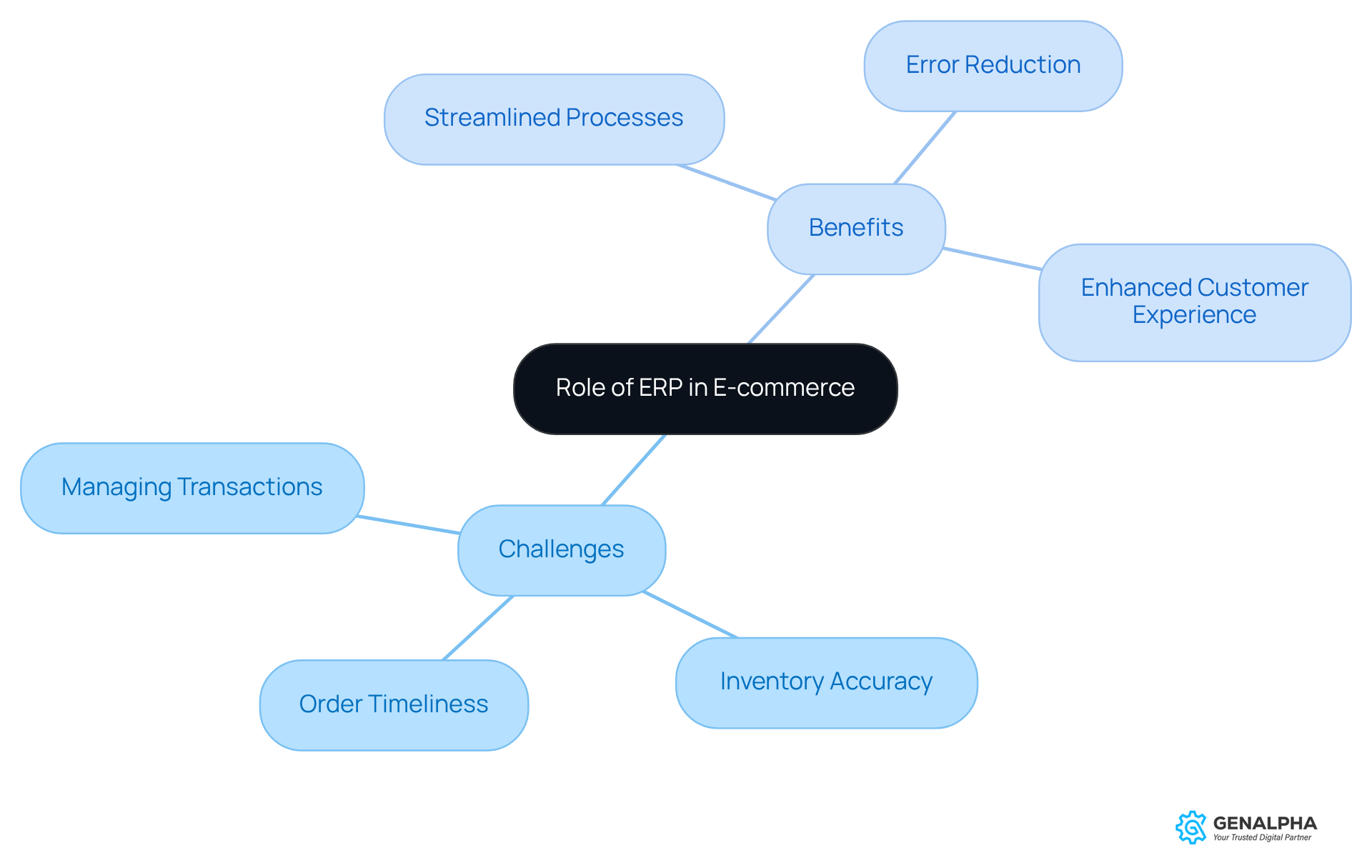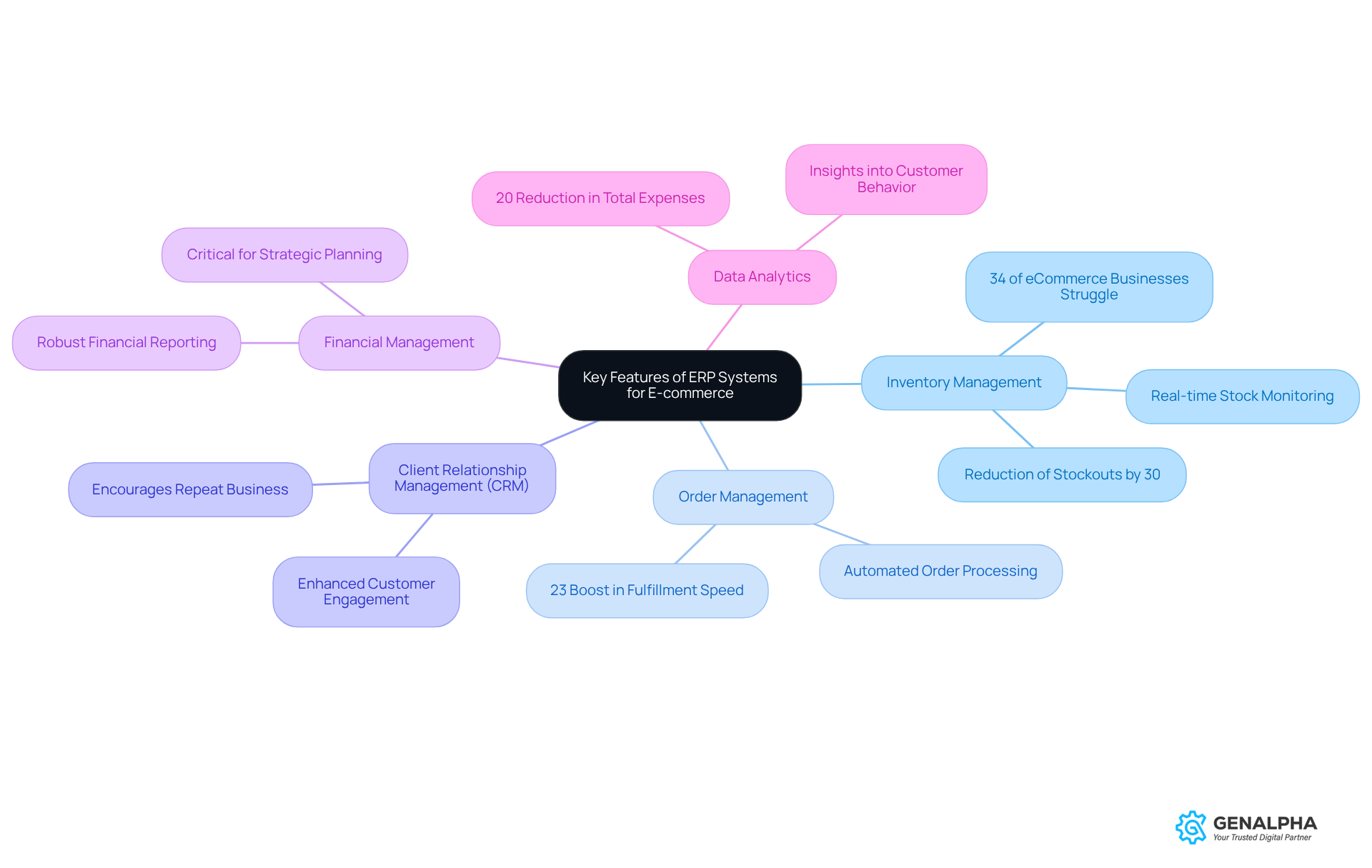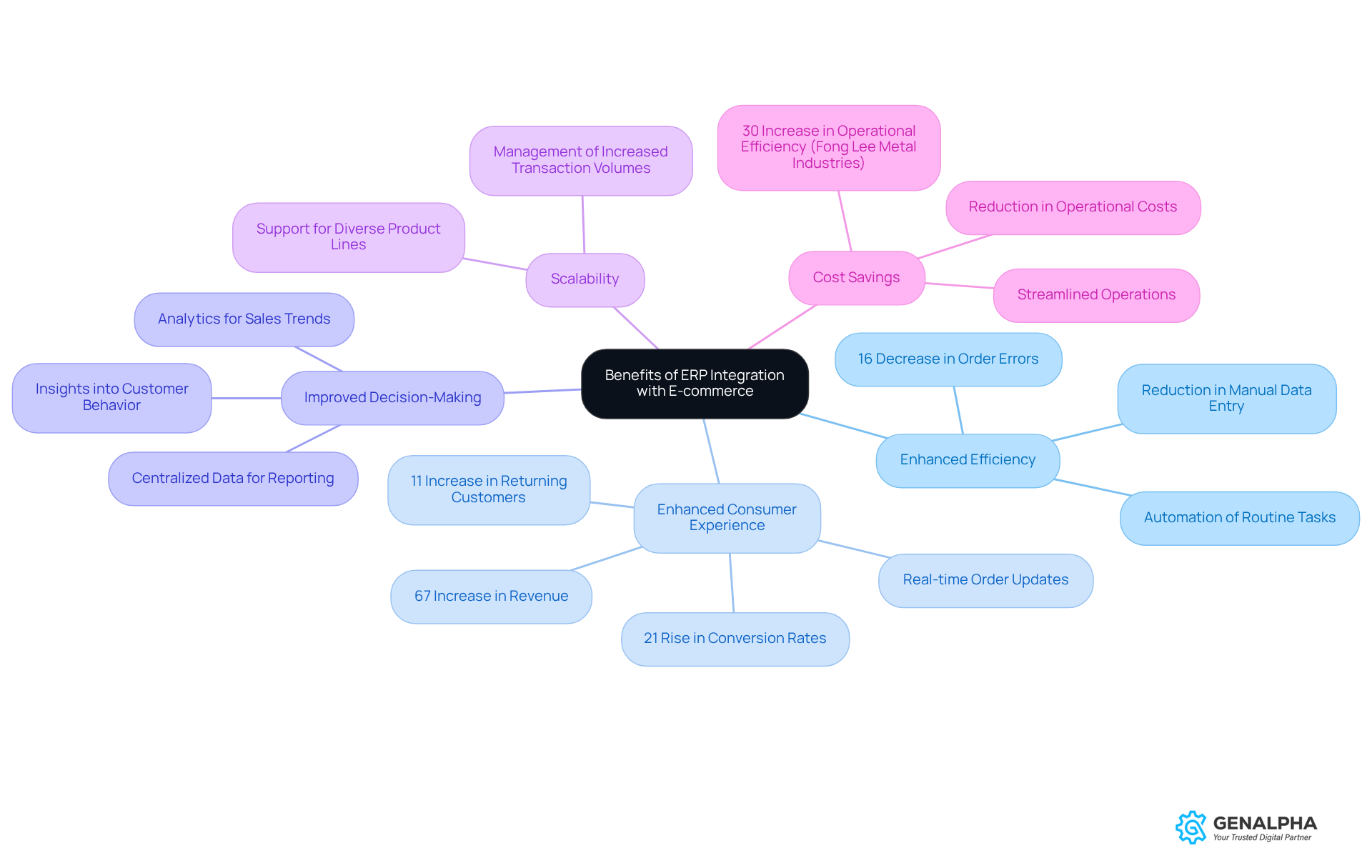Overview
Have you ever wondered how some e-commerce businesses seem to operate like a well-oiled machine? The secret often lies in their use of ERP systems. These systems are game-changers, streamlining operations, enhancing customer experiences, and improving decision-making.
Let’s dive into what makes ERP systems so beneficial. Think about features like:
- Inventory management
- Order processing
- Data analytics
These tools work together to drive efficiency and scalability. As a result, businesses can boost their revenue and keep their customers happy in the competitive online marketplace.
In essence, ERP systems are not just about keeping things organized; they’re about transforming how businesses interact with their customers and make decisions. So, if you’re looking to elevate your e-commerce game, it might be time to explore how an ERP system can work for you. What are your thoughts on integrating such technology into your operations?
Introduction
In the ever-changing world of online retail, have you ever wondered how businesses keep up with the demands of customers? It’s a tricky landscape, but one thing is clear: companies are always looking for ways to improve their operations and keep their customers happy. Enter Enterprise Resource Planning (ERP) systems! These powerful tools are designed to integrate various functions like inventory management, order processing, and customer relations, making e-commerce processes smoother than ever.
But here’s the million-dollar question: how can these systems be used effectively to not just enhance efficiency but also adapt to the fast-paced digital marketplace? What key features and benefits of ERP systems can really help businesses thrive in such a competitive environment? Let’s dive in and explore!
Define ERP Systems in E-commerce
Have you ever wondered how businesses keep everything running smoothly? Enter Enterprise Resource Planning (ERP) systems! These integrated software solutions are like the backstage crew of a theater, managing and streamlining essential processes across various departments—think finance, inventory, sales, and client service.
In the bustling world of online commerce, the ERP system eCommerce plays a crucial role. They ensure that information flows seamlessly between digital sales platforms and the ERP system eCommerce for back-end operations. This means that companies can keep a real-time pulse on inventory levels, order processing, and customer information. Pretty neat, right?
Ultimately, this integration not only but also enhances customer satisfaction. Imagine knowing exactly what you have in stock and being able to process orders without a hitch. Wouldn't that make your shopping experience even better? So, if you're looking to improve your business operations, considering an ERP system might just be the way to go!

Contextualize the Role of ERP in E-commerce
In today’s fast-paced online retail world, businesses face a host of challenges. Think about it: managing a flood of transactions, keeping inventory counts accurate, and ensuring orders arrive on time can be quite the juggling act! This is where the comes into play. They serve as a central hub that connects various functions within an organization, helping companies respond quickly to market demands.
By providing a unified view of operations, the ERP system ecommerce empowers online retailers to streamline processes, reduce errors, and enhance their customer experiences. For example, imagine automating order processing and inventory management—this allows businesses to shift their focus to strategic growth initiatives. Doesn’t that sound like a game changer?
So, how can you leverage these systems for your business? Embracing an ERP system ecommerce could be your ticket to smoother operations and happier customers. Let’s dive into how you can make this happen!

Identify Key Features of ERP Systems for E-commerce
When it comes to ERP systems designed for e-commerce, there are some key features that really stand out:
- Inventory Management: Keeping an eye on stock levels in real-time across different sales channels is super important. Nobody wants to deal with stockouts or overstocking, right? In fact, about 34% of eCommerce businesses struggle with managing inventory on multiple platforms. This just goes to show how crucial effective inventory control is for maintaining customer trust and satisfaction.
- Order Management: Imagine how much smoother things could be with automated order processing! It really speeds up the fulfillment process, cutting down the time from when a customer places an order to when they receive it. A well-managed inventory system can boost fulfillment speed by up to 23%, which is a game-changer for client satisfaction, especially for equipment manufacturers facing operational hurdles.
- Client Relationship Management (CRM): Integrated CRM features make it easy for organizations to manage customer interactions, track purchase history, and personalize marketing efforts. This kind of integration helps build stronger customer connections and encourages repeat business. Companies that leverage CRM within their ERP systems often see better engagement and loyalty from their customers.
- Financial Management: With robust financial reporting and analytics, ERP systems help organizations keep tabs on profitability and manage cash flow effectively. This kind of financial oversight is critical for strategic planning, especially in the competitive online marketplace where equipment producers need to make the most of their resources.
- Data Analytics: Advanced analytics tools let businesses dive deep into customer behavior, sales trends, and overall performance. Those who use data analysis for inventory decisions can see a whopping 20% reduction in total expenses! This really highlights how important data-informed decision-making is for boosting online retail operations.
In short, these essential features of the ERP system e-commerce are not just about improving efficiency; they’re also about addressing the unique challenges faced by equipment manufacturers in the online marketplace. So, how are you planning to leverage these tools in your own business?

Explore Benefits of ERP Integration with E-commerce
Integrating an ERP system ecommerce with e-commerce platforms can really change the game for businesses, offering some fantastic benefits that you might not have considered.
- Enhanced Efficiency: Imagine automating those tedious routine tasks—no more manual data entry and fewer errors! This means your team can focus on what really matters, like higher-value activities. In today’s competitive world, where every second counts, this efficiency is key.
- Enhanced Consumer Experience: Think about how frustrating it is to not know the status of your order. With , businesses can give clients precise information, leading to happier customers. For instance, companies using ERP-integrated online shopping solutions have seen a whopping 67% boost in revenue and an 11% increase in repeat customers. That’s a clear win for loyalty! Plus, those same organizations often enjoy a 21% rise in conversion rates, which just goes to show how much this integration can enhance client experience and sales.
- Improved Decision-Making: What if you could make decisions based on solid data? With centralized information, organizations can dive deep into reporting and analytics, making informed choices that reflect real-time insights. Integrated systems reveal valuable information about customer behavior, sales trends, and inventory performance—essential for adapting to the fast-paced market and shifting customer preferences.
- Scalability: As your online retail business grows, you need systems that can keep up. ERP systems are designed to scale, managing increased transaction volumes and diverse product lines without missing a beat. This scalability is crucial for thriving in the ever-evolving digital marketplace.
- Cost Savings: Who doesn’t love saving money? Streamlined operations and better inventory management can lead to significant cost reductions, boosting your bottom line. Businesses that embrace ERP integration typically see a 16% decrease in order errors, which translates into lower operational costs and improved financial performance. Plus, combining multiple functions through ERP integration makes those cost savings even more impressive.
Looking ahead to 2025, as digital channels take the lead in B2B sales interactions, the integration of an ERP system ecommerce will be more important than ever. It’s all about enhancing customer experiences and operational efficiency, and you don’t want to miss out on that!

Conclusion
Exploring ERP systems in e-commerce really highlights their crucial role in boosting business operations and enhancing customer experiences. By seamlessly integrating functions like inventory management, order processing, and customer relationship management, ERP systems help streamline processes. This means businesses can respond effectively to market demands. Not only does this integration ramp up operational efficiency, but it also nurtures customer satisfaction—making it a must for any online retailer looking to thrive in today’s competitive landscape.
Key takeaways from our discussion showcase the standout features and benefits of ERP systems designed for e-commerce:
- Real-time inventory tracking
- Advanced data analytics
These tools empower businesses to make informed decisions, cut operational costs, and ultimately boost customer loyalty. Automating routine tasks and providing customers with timely order updates leads to a smoother workflow and a better shopping experience.
As the digital marketplace keeps evolving, the need to adopt an ERP system for e-commerce is more important than ever. If businesses want to maintain a competitive edge, leveraging these powerful tools is essential—not just to streamline operations but also to adapt to changing consumer expectations. By embracing ERP integration today, you’re setting yourself up for sustainable growth and success in the future of online retail. So, why wait? Let’s take that step together!
Frequently Asked Questions
What are ERP systems in e-commerce?
ERP systems, or Enterprise Resource Planning systems, are integrated software solutions that manage and streamline essential processes across various departments, such as finance, inventory, sales, and client service.
How do ERP systems benefit online commerce?
ERP systems ensure seamless information flow between digital sales platforms and back-end operations, allowing businesses to maintain real-time awareness of inventory levels, order processing, and customer information.
What impact do ERP systems have on operational efficiency?
The integration of ERP systems boosts operational efficiency by enabling accurate inventory tracking and smooth order processing, which ultimately enhances customer satisfaction.
How do ERP systems improve customer experience?
By providing real-time data on inventory and order processing, ERP systems help businesses serve customers better, leading to a more efficient shopping experience.


